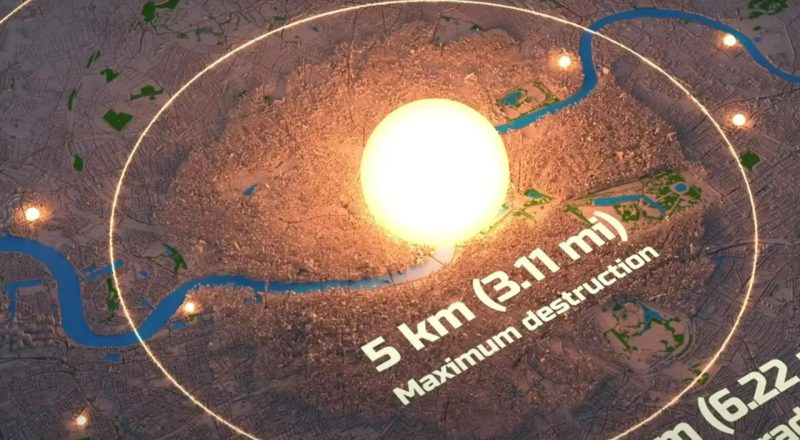A CHILLING simulation showing London being nuked has been shown on Russian TV in a chilling threat from Vladimir Putin.
The blast, which detonates over Westminster, shows the fireball evaporating central London in a sickening animated video.
Buildings are destroyed and a mushroom cloud goes high into the sky above the capital.
Buckingham Palace, The City, The Shard, and some of the greatest arts and cultural sites in the world are obliterated.
As the explosion spreads, the clip has a rolling ticker estimating how many would die from Putin’s sick decision.
Eventually, around 850,000 people would be evaporated and two million would be injured with a 750 kiloton bomb.
Another 450,000 people will soon die from burns, injuries, and radiation, raising the death toll to nearer 1.5million.
The clip was aired on a staunchly pro-Putin propaganda TV channel and appears to be the latest move to scare Britain from giving permission to Ukraine to fire Storm Shadow missiles far inside Russia.
The video shown begins by threatening: “Imagine for a moment that the unimaginable happens.”
The commentary warns viewers: “Upon detonation, a fireball as hot as the sun rapidly expands, reaching a radius of 950 metres (1,039 yards).
“Anything trapped inside this fireball is instantly vaporised.
“In our simulation, the epicentre of the explosion is at Westminster.
“People within that radius won’t even feel anything because the nerve impulse transmission speed is slower.
“Within 5 km (3 miles) of the epicentre the blast radius: City of London, Camden town, Kensington, Brixton, these areas will receive the most destruction.”
A ticker on the screen shows the number of fatalities climb as the fireball and shockwave spreads.
“Buildings will be destroyed and debris will fill the streets, creating extremely dangerous conditions for everyone in the vicinity.
“Given the population density in central London, the initial death toll could exceed 250,000 people and around 600,000 injured within a radius of 10 km (6.25 miles) the radiation will cause third degree burns.
“Within that radius anything that can burn will catch fire.
“Petrol stations, automobiles, power substations, gas infrastructure.
“Explosive facilities will explode and amplify the effect of the devastation over a huge area, including areas from Camden to Greenwich and Islington to Wandsworth.”
The video was initially published on TV around three months ago, but has now been highlighted by a Telegram channel.
It goes on: “Within an 18 km (11 mile) radius of the blast, the shockwave will be enough to shatter windows, causing additional casualties to people who come to the windows when they see the nuclear blast.
“The shockwave will reach Hounslow, Edgware and Enfield.
“Depending on the wind, the fallout could spread well beyond the immediate blast zone, potentially affecting areas up to five to 10 km away, causing damage even in regions such as Essex or Surrey.
“If the explosion were to occur on the ground rather than in the air, the fallout map would be greatly expanded and the radioactive fallout could even reach Manchester, infecting people, land and animals.
“The problem with a nuclear explosion in London is also that London is essentially not designed to survive such a disaster.
“Eleven of London’s twenty hospitals would be within the blast.
“The remaining hospitals would be physically unable to cope with the number of victims
“Many people are still alive under the rubble of the buildings suffering burns but no one would be able to help them.”
Other hardline Russian outlets also showed the video.
It comes as Sir Keir Starmer is weighing whether to let UK-made Storm Shadow missiles be fired over the border.
Valerii Zaluzhnyi, Ukraine’s ambassador to the UK, told Labour’s conference
He said: “If Russia fires missiles at any targets in Ukraine it’s Ukraine’s right to respond in kind by hitting military targets within Russia. It’s the principle of self-defence.”
Putin recently tested a doomsday Satan nuke, but destroyed the launch site after a “major blast during a failed test”.
A giant crater is seen at Plesetsk cosmodrome in northern Russia – the result of a supposed catastrophic failure of a test launch.
Putin’s nuclear arsenal












